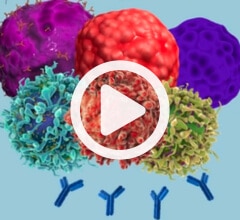Next Generation Solutions for Immune and CAR T Cell Therapy
Tune the Drivers of
Immune Cell Potency,
Fate, and Persistence

Develop a safe, potent, and persistent immune cell product by understanding immune cell function. Whether it be activation, proliferation, cell fate, cytotoxic killing, or immunomodulation, Agilent is dedicated to supporting your next-generation therapies with key technologies.
Develop new immune cell therapies:
- Agilent SureGuide portfolio Perform stable, on target CRISPR editing of immune cells to engineer highly specific cell therapies.
-
Agilent xCELLigence RTCA and
Seahorse XF technologies Assess and validate function, fate and fitness of immune cells on real time live-cell platforms that deliver relevant functional data. - NovoCyte Quanteon flow cytometer Establish actionable phenotypes at the benchtop for immune cell subsets including lineage and functional poise by multiparametric flow.

Understand the effects of immune cell therapies on a constantly evolving tumor microenvironment:
- Test gene edits and other interventional strategies for phenotype, potency, fitness, on/off target effects, and cell fate programming.
- Correlate relevant kinetic data to inhibitory effects such as exhaustion, anergy, and other escape phenotypes due to interactions with a constantly evolving tumor and its microenvironment.
- Sensitively measure live cell function and simultaneously scan the temporal components of an ever-evolving immune response in terms of efficacy, persistence, and safety.

Define key quality control attributes for cell therapy manufacturing:
- Seamlessly transition to SureGuide RNAs manufactured under GMP with the same expected quality and performance.
- Quantify the efficacy of cell therapies to better define key quality and process performance criteria with real-time potency assays.
- Generate reliable analytics for the quality control and release of compliant products.

 xCELLigence RTCA
xCELLigence RTCA
Real-time cell analysis and imaging
 Seahorse XF technologies
Seahorse XF technologies
Kinetic analysis of immune cell fate
 NovoCyte Quanteon
NovoCyte Quanteon
Flow cytometry for immuno-oncology
 SureGuide CRISPR sgRNA
SureGuide CRISPR sgRNA
Stable, on-target gene editing

Measure immune cell-mediated killing in real time xCELLigence RTCA biosensor technology provides a label-free, robust, and simple workflow, enabling measurement of diverse effector cells and molecules for cytotoxicity. It is a platform for more sensitive in vitro potency assessment that helps mimic activities in vivo.

Live cell imaging now available With the new xCELLigence eSight, live cell imaging and real-time biosensor measurements can be performed on the same cell populations, which provides important information on cell behavior.

More accurate and reproducible cytolytic data In the figure above, cytolysis of target PC3 (prostate) cancer cells by NK92 effector cells are continuously measured on the xCELLigence system for 48 hours, starting at effector-to-target ratios as low as 0.625:1.
xCELLigence Real-Time Cell Analysis (RTCA)
Quantify dynamic cell behavior that can be missed by labor-intensive endpoint methods to gain a more comprehensive measure of cancer cell killing, including potential escape phenotypes.

Both glycolysis and mitochondrial oxidative phosphorylation shape T cell activation and effector function. Glycolysis drives a robust, short-lived effector phenotype. In contrast, OXPHOS and fatty acid metabolism tunes persistence and sustained T cell memory formation.

Open an early window to detect T cell activation responses within minutes of stimulation by measuring glycolytic extracellular acidification rate (ECAR) in real time. Learn more
Agilent Seahorse XF analysis
Discover and tune immune cell programming to mount a sustained and robust antitumor response. Real-time metabolic analysis enables you to measures and tune the drivers of immune cell fate and function. Quantify activation kinetics and determine the optimal metabolic phenotype and fitness to shape product potency.
NovoCyte and Quanteon flow cytometers
High-performance benchtop flow cytometers designed for all levels of users. For quick and accurate immunophenotyping with up to 25 channels of fluorescence using the most sensitive silicon photomultiplier detector technology on the market. Experience the new standard in flow cytometry.

Monitor T-cell expansion, compound toxicity, drug effects on tumor cell growth, immune cell behavior under different conditions, and much more.
NovoCyte software has a built-in module for cell proliferation modeling, which is shown in the diagram above. It identifies each generation of cell division, and then calculates the proliferation index.


NovoCyte Quanteon is the most advanced benchtop flow cytometer on the market today. With four lasers and up to 25 independent photomultipliers it is ideal for conducting immuno-oncology research to support the most demanding panels. Add the NovoSampler Q for walk-away automation.
The above shows an 18-color pan-leukocyte immunophenotyping panel on PBMCs using the NovoCyte Quanteon. This panel was designed to monitor different immune subsets with activation and differentiation markers.
Agilent SureGuide chemically synthesized sgRNAs
Agilent chemically synthesized guide RNAs facilitate the full potential of CRISPR for cellular engineering and immunotherapy.
These long, high quality, chemically synthesized single guide RNAs are ideal for CRISPR-based cell engineering. We offer customization options, such as modifications to increase stability and specificity, for consistent results and robust, novel therapeutics development. Small-scale research grade manufacturing and large-scale GMP manufacturing capabilities result in an end-to-end solution for your cell engineering needs–from research through clinical trials, providing quality and reliability you can depend on.

Proprietary chemistries enable the synthesis of long, high purity sgRNAs. This process facilitates the scalable manufacturing of highly pure sgRNAs, affords unique options for sgRNA design, and precise installation of molecular functionality to augment CRISPR-Cas performance.

Customization options include the ability to add modifications to increase stability and specificity for more consistent results. For example, adding a single modification at either position 5 or 11 of the hemoglobin subunit beta (HBB) guide RNA sequence dramatically reduced the level of off-target activity while maintaining a high level of activity at the on-target site.
Want to learn more about the Agilent immune cell therapy tool bench? Whether you would like to speak to an expert, request a demo, or simply request more information, we would be happy to connect with you.

For Research Use Only. Not for use in diagnostic procedures.














